US election 2020: How will Biden change foreign policy?
- Published
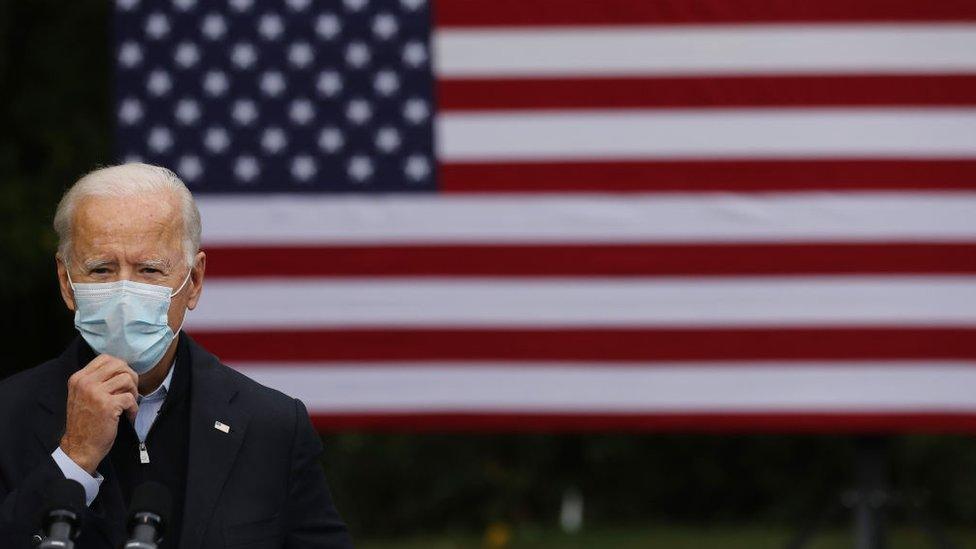
The world according to President Trump has been one of "America First" nationalism, ditching international agreements that he believed gave the US a raw deal.
It was transactional, disruptive and unilateralist. It was also personal and erratic, shaped by his gut feelings and relationships with leaders, and driven by his Twitter feed.
The world according to Joe Biden is a much more traditional take on America's role and interests, grounded in international institutions established after World War Two, and based on shared western democratic values.
It is one of global alliances in which America leads free nations in combating transnational threats.
What could change under Biden? A few things stand out - the approach to allies, to climate change, and to the Middle East.
DEALING WITH ALLIES
President Trump has praised autocrats and insulted allies. At the top of Joe Biden's to-do list is repairing strained relationships, especially in Nato, and rejoining global alliances.
A Biden administration would also return to the World Health Organization and seek to lead an international coronavirus response.
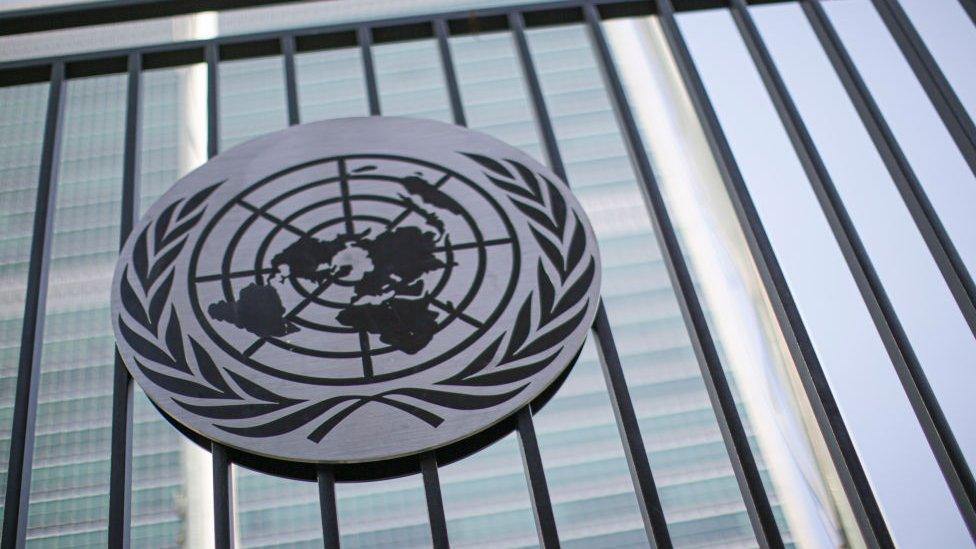
Democratic challenger Joe Biden is expected to reach out to global institutions
Mr Biden's campaign framed this as a major reset to rescue America's damaged image and to rally democracies against what it sees as a rising tide of authoritarianism.
But it might be more style than substance, counters Danielle Pletka of the conservative American Enterprise Institute. She argues that the Trump administration has achieved a lot on the global stage, just with sharp elbows.
"Have we lost friends to go to parties with? You bet," she says. "Nobody wants to go to parties with Donald Trump. Have we lost power and influence on the metrics that actually have mattered for the last 70 years? No."
CLIMATE CHANGE
Speaking of substance, Joe Biden says he will make fighting climate change a priority and rejoin the Paris Climate Agreement, which is one of the international accords that Donald Trump dumped.
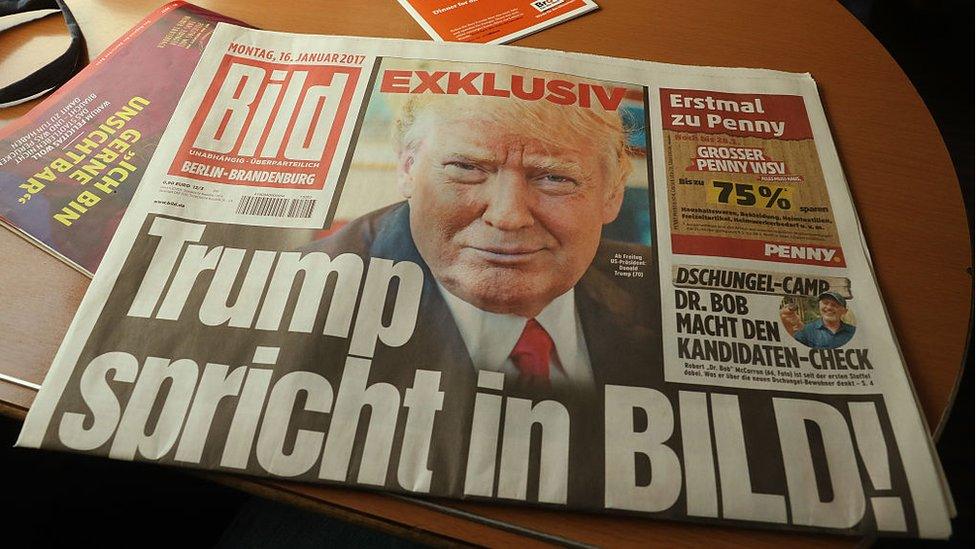
President Donald Trump has used "sharp elbows" on the global stage
On this issue the two men are polar opposites. Mr Trump sees tackling global warming as a threat to the economy. He has promoted fossil fuels and rolled back scores of environmental protections and climate regulations.
Mr Biden is promoting an ambitious $2 trillion dollar plan to achieve goals for cutting emissions. He says he would do this by building a clean energy economy, creating millions of jobs in the process.
IRAN
Joe Biden says he's prepared to rejoin another international accord abandoned by President Trump - the deal that gave Iran sanctions relief in exchange for scaling down its nuclear programme.
The Trump administration withdrew in 2018, saying the arms control agreement was too narrow to cope with the threats posed by Iran, and too weak in its limits on nuclear activity, which expire over time.
It re-imposed sanctions and continues to pile on economic pressure, recently blacklisting almost all of Iran's financial sector. In response Iran has stopped observing some of the restrictions on its nuclear activity.
Mr Biden says this "maximum pressure" policy has failed, emphasising that it led to a significant escalation in tensions, that allies have rejected it, and that Iran is now closer to a nuclear weapon than it was when Trump came to office.
He says he will rejoin the nuclear accord if Iran returns to strict compliance - but he wouldn't lift sanctions until then. Mr Biden would then negotiate to address concerns he shares with the president.
YEMEN
Mr Biden would also end US support for the Saudi-led war in Yemen. The high civilian death toll has built strong opposition to US involvement from the left wing of the party and a growing number of lawmakers in Congress.
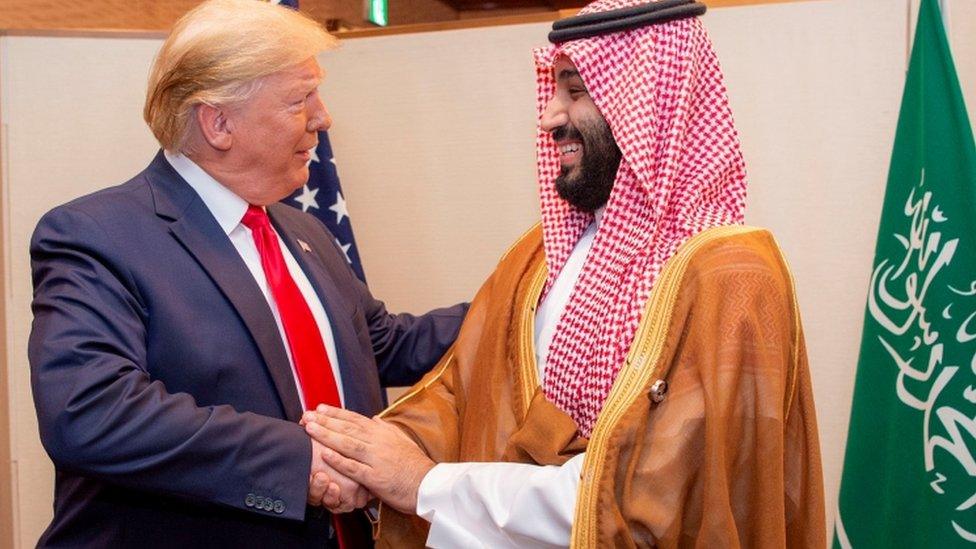
Saudi Arabia is a close US ally
Saudi Arabia is President Trump's closest Arab ally, a cornerstone of the anti-Iran alliance. Analysts see Mr Biden stepping back from Mr Trump's largely uncritical embrace of the Gulf monarchy.
"I do think that on the Middle East, there will be a sea change," says Ms Pletka, "a more pro-Iran policy and a less pro-Saudi policy, for sure."
ARAB-ISRAELI CONFLICT
Joe Biden welcomed President Trump's agreement between Israel and the United Arab Emirates. Like the Democratic old guard, Mr Biden is a staunch supporter and long-time defender of Israel - the word occupation is not included in the party's foreign policy platform.
But he is unlikely to adopt the Trump administration's policies towards the occupied West Bank. These include a declaration that Israeli settlements do not violate international law, and tolerance of - if not enthusiasm for - Israeli plans to unilaterally annex parts of the territory.
Israel's borders explained in maps
The Democratic Party's left wing, which has a much more developed and assertive foreign policy coalition than in previous years, is pushing for greater action on Palestinian rights.

Democratic presidential candidate Joe Biden is a defender of Israel, but his policy on the West Bank is likely to differ from the current one
"I think we've had much stronger engagement from Palestinian rights advocates, Palestinian Americans, Arab Americans," says Matt Duss, a foreign policy adviser to Mr Biden's one-time rival, Bernie Sanders, "but also a number of Jewish American groups who understand that ending the occupation is a key issue for United States foreign policy."
So that's something to watch.


What would stay the same-ish?
Like President Trump, Mr Biden wants to end the forever wars in Afghanistan and Iraq, although he would keep a small troop presence in both to help battle terrorism. Nor would he slash the Pentagon budget or suspend drone strikes, despite pressure from the left.
And when it comes to geopolitical adversaries, there may be less of a difference than you'd expect.
RUSSIA
The relationship at the top would certainly change. President Trump often seemed ready to personally forgive Vladimir Putin for behaviour that violated international norms.
But the Trump administration has been pretty tough on Russia, punishing it with sanctions. That would probably continue under a Biden presidency, without the mixed messaging.
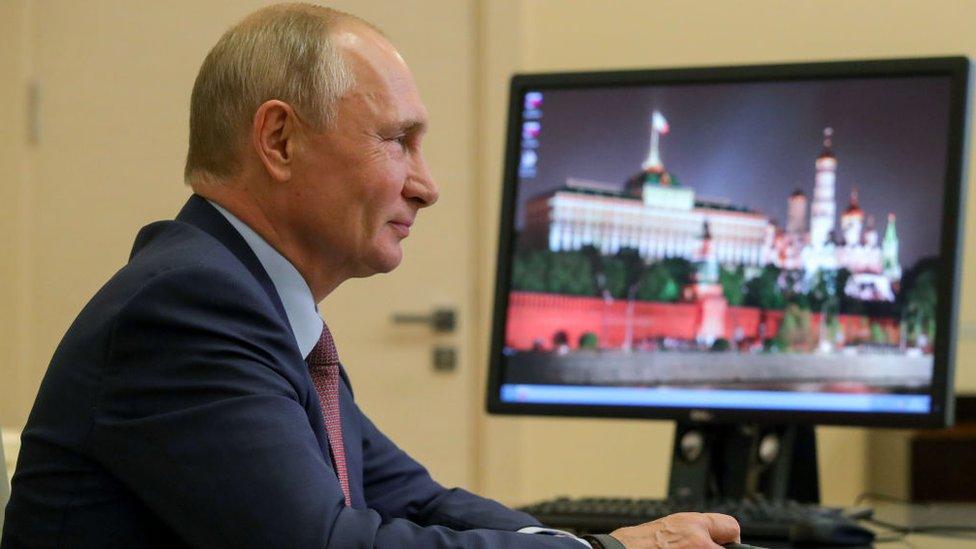
There could be little change in America's nation-to-nation relationship with Russia
The former vice-president bluntly told CNN he believed Russia was "an opponent." He's promised a forceful response for election interference, and for alleged bounty payments to the Taliban to target American troops in Afghanistan, something Mr Trump hasn't addressed.
At the same time Mr Biden has made clear that he wants to work with Moscow to preserve what's left of the arms control treaties constraining their nuclear arsenals. President Trump has pulled out of two, accusing Russia of cheating, and is trying to negotiate the extension of a third which expires in February. Biden has committed to extending it without conditions if he's elected.
CHINA
In 2017, Mr Trump described how he and Xi Jinping bonded over chocolate cake. But since then MR Trump has traded his friendship with the Chinese president for accusations about spreading the coronavirus, for harsh measures and a new Cold War rhetoric.
In fact there is rare cross-party agreement on getting tough with China over trade and other issues. The question is about tactics.
Mr Biden would continue President Trump's policy of countering China's "abusive economic practices," but jointly with allies, as opposed to Trump's preference for unilateral trade deals.
The sharp elbows of the Trump administration have been successful in winning global support for a boycott of Chinese communications technology. That's part of a serious escalation in US efforts to push back against Beijing on many fronts, which has brought relations to their lowest point in decades.
This campaign is led by Trump's China hawks - strategic competition they call it, but strategic confrontation is how some analysts describe it. Joe Biden would more actively seek areas of cooperation with a rising China.
He says he wants to revive American leadership.
But the world has also changed in the past four years, with the robust return of great power competition and recent polls showing America's reputation has plummeted even amongst staunch allies, those Mr Biden would aspire to lead.